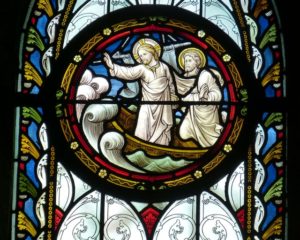
Power in the Name of Jesus.
There is power in the name of Jesus. The phrase “pray in the name of Jesus” is often used by Christians, and it refers to the practice of praying to God and asking for His help, guidance, or protection.
26 But you were unwilling to go up. You rebelled against the command of the Lord your God; 27 you grumbled in your tents and said, “It is because the Lord hates us that he has brought us out of the land of Egypt, to hand us over to the Amorites to destroy us. 28 Where are we headed? Our kindred have made our hearts melt by reporting, ‘The people are stronger and taller than we; the cities are large and fortified up to heaven! We actually saw there the offspring of the Anakim!’” 29 I said to you, “Have no dread or fear of them. 30 The Lord your God, who goes before you, is the one who will fight for you, just as he did for you in Egypt before your very eyes, 31 and in the wilderness, where you saw how the Lord your God carried you, just as one carries a child, all the way that you traveled until you reached this place. 32 But in spite of this, you have no trust in the Lord your God, 33 who goes before you on the way to seek out a place for you to camp, in fire by night, and in the cloud by day, to show you the route you should take.” 34 When the Lord heard your words, he was wrathful and swore: 35 “Not one of these—not one of this evil generation—shall see the good land that I swore to give to your ancestors, 36 except Caleb son of Jephunneh. He shall see it, and to him and to his descendants I will give the land on which he set foot, because of his complete fidelity to the Lord.”
Deuteronomy 1:26-36 NRSV
As humans we find ourselves in situations where we begin to realize inadequacies. When it comes to our faith, inadequacies show up in our doubt and lack of faith. We are often swayed by what we see, and then base our belief on what we witness.
Faith calls us to go beyond what we see and believe in God based on His word and history. The problem is that we all to often forget history, the things that God has done for us, and we focus on what is in front of us. And when we do this we begin to doubt.
26A week later his disciples were again in the house, and Thomas was with them. Although the doors were shut, Jesus came and stood among them and said, “Peace be with you.” 27 Then he said to Thomas, “Put your finger here and see my hands. Reach out your hand and put it in my side. Do not doubt but believe.” 28 Thomas answered him, “My Lord and my God!” 29 Jesus said to him, “Have you believed because you have seen me? Blessed are those who have not seen and yet have come to believe.” John 20:26-29 NRSV
Our passage today is a real-life example of God’s promise and Israel’s disbelief. Despite the positive report and evidence of the land’s productivity, the people refused to enter because the rest of the report was discouraging.
The Israelites were so terrified of the Anakites because of their size and might, the high walls of their huge towns, and the presence of the Anakites, that they rebelled against the Lord, misinterpreted his attitude toward them, and refused to believe in his promises. “The LORD hates us,” they grumbled in their tents, when in fact he loved them.
They said that the Lord had taken them out of Egypt to be destroyed by Amorite hands, but this was not the case. Moses reassured the people, saying that the Lord their God would go ahead of them, just as he had done in Egypt and Sinai. God had taken them along right in front of their eyes.
Israel had been so upset by the news that they had disobeyed the Lord’s instruction and refused to enter the land (v. 26). Furthermore, the nation had not only allowed fear to overcome their faith, but they had also grumbled among themselves (v. 27) against God, mischaracterizing His tremendous love for them as deliberate hostility.
Israel had disobeyed the Lord’s earlier admonition not to be afraid or discouraged (1:21). Israel’s understanding of theological reality had become so twisted that they had claimed that the Lord… despised them to the point of destroying them (v. 27).
Indeed, He had only freed them from Egypt in order to transfer them into the hands of the Amorites. They apparently reasoned that God had deemed Egypt’s servitude insufficiently burdensome and that what He really wished for the nation of Israel was their complete destruction.
Due to their reluctance to enter the land despite the Lord’s leadership’s promises, the Lord vowed that they would never see that good land. Only a small group of Israelites under the age of twenty, together with Caleb and Joshua, would be permitted entry into the promised land (cf. Nu 14:30-31). Calib was absolutely dedicated to and obedient to the Lord, since the Bible states that he “followed the LORD wholeheartedly.” God had promised him a place in the region he’d discovered.
God wants to bless His people who are obedient and believe in Him and His word. When we say we stand on God’s promises, what we are saying is that no matter what we face in this life, no matter what difficulties we face, we are not going to doubt or waver on God’s word and promise.
If God promises us something, what we see in front of us doesn’t matter, our faith remains strong.
22 It has often cast him into the fire and into the water, to destroy him; but if you are able to do anything, have pity on us and help us.”23 Jesus said to him, “If you are able!—All things can be done for the one who believes.” 24 Immediately the father of the child cried out, “I believe; help my unbelief!” 25 When Jesus saw that a crowd came running together, he rebuked the unclean spirit, saying to it, “You spirit that keeps this boy from speaking and hearing, I command you, come out of him, and never enter him again!” Mark 9:22-35 NRSV
People started to doubt when they saw that Jesus’ disciples were not able to cast out the demons in the boy. Even the boy’s father began to doubt if it was possible to have his son delivered from the demons.
When the man came to Jesus, he believed and asked for help with his unbelief. It is human nature to become fearful based on what we see. This is why is important to continually believe and ask God to be the author and perfector of our faith.
Therefore, since we are surrounded by so great a cloud of witnesses, let us also lay aside every weight and the sin that clings so closely, and let us run with perseverance the race that is set before us, 2 looking to Jesus the pioneer and perfecter of our faith, who for the sake of the joy that was set before him endured the cross, disregarding its shame, and has taken his seat at the right hand of the throne of God. 3 Consider him who endured such hostility against himself from sinners, so that you may not grow weary or lose heart. Hebrews 12:1-3 NRSV
Here is a story of Ernest Hemmingway and a hunt for sable
Ernest Hemmingway hunts for sable antelope in “Green Hills of Africa”. He kills a massive chestnut-colored cow before spotting an enormous black bull, which he kills, eventually due to a bad shot. He locates the cow, but he and his crew of trackers and porters spend the entire day searching for the bull. I feel the terminology he employs is not by chance.
Some of the soldiers were sitting behind trees or seeking half-heartedly by the middle of the day. They began to doubt the existence of the bull sable. Perhaps it was just a large cow that they had already discovered. Instead, their smaller cow had escaped. There was no such thing as a bull. It was difficult for Hemmingway to keep looking against the power of so much disbelief, he acknowledges. It was difficult to believe the bull even existed. He began to doubt the presence of the bull.
Then he imagined the scene, with the bull bursting from the trees. His own errant shot as a result of his own elation. The bull breaking through the grass and running, the magnitude of his horns. He’d shot the bull, not the other way around. His tracker had a memory of him as well. They just had to keep looking for the bull. Others briefly grabbed on to the faith, but finally gave up. It was difficult for even the leaders to maintain their faith.
This is a fascinating dynamic. Consider how love operates. If a man does not express his love for his wife on a regular basis, she will begin to mistrust it. It is only by talking about it that the reality is reinforced. It strengthens one’s faith.
This is more than a tale about sables and big game hunters. It’s about faith and the unbelieving dynamic. The dwarf in C.S. Lewis’ story “Prince Caspian” did not believe in Aslan. Peter didn’t notice him, and Lucy didn’t seem to notice him either. Susan had faith in Lucy but refused to express it. Edmund believed, articulated his viewpoint, but ultimately yielded to the elders in the room.
In the end, skepticism triumphed. The unbelievers had an impact on the believers.
Because we are all human, we will all feel inadequate at some point. So the true question for you and me is not whether we are capable of completing a task, but how we behave when a challenge exceeds our ability. We often desire to run in the opposite direction when a hurdle grows in our minds, away from the difficulty and toward safety. Ignoring a task that God has given us, on the other hand, will lead to slavery. The more we feed our fears, the more we’ll be ruled by thoughts of inadequacy, which will have an impact on our actions and, eventually, our future.
In today’s reading, take a look at the Israelites. They were terrified as they stood on the outskirts of the Promised Land. The enemy’s bulk and might were intimidating. Those Israelites never saw the land that God had promised them because they refused to trust the Lord and press on to conquer the locals. When we allow fear take precedence over faith, we frequently miss out on opportunities.
Recognize your feelings of inadequacy when God calls you to a task beyond your talents, and then choose to trust Him and His promises. You will find the Lord’s faithfulness by pressing forward in trust despite your fear. He always equips us for the tasks He gives us.

There is power in the name of Jesus. The phrase “pray in the name of Jesus” is often used by Christians, and it refers to the practice of praying to God and asking for His help, guidance, or protection.

Two things about the death of Christ. The first was that since one person died for and in place of everyone else, everyone had died. What is this death at the end? Either the death they deserved because of their sin.

It’s odd how we often acknowledge that we take on too much, and try to accomplish things in our own strength, and need to rely more on Jesus. And yet we continue to do the same thing over and over.

The conscience is a divinely given moral compass that can be swayed by many factors, such as our background, experiences, and thoughts. What is important is the truth that one has to inform their conscience.

Life is rough for most people today. Just when we have hope of a life returning to normal, we are seeing things none of us have ever seen in our lifetime.

To grasp the magnitude of our deliverance, we must first comprehend where we came from. We are not exempt from the repercussions of our actions because we are descendants of Adam.

